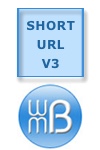
Index
[home]
| General | Control Panel | |
|---|---|---|
Set Up URLs
An alias (or code, depending on how you think of it) is the sequence of characters at the end of the shortened URL. Example:
http://example.com/go/ALIAS
The alias is the key the software uses to determine the actual destination URL.
Use the first text box on the Set Up URLs page to list the URLs to be changed into shortened URLs. Optionally, specify a custom alias by typing the alias and a space in front of the URL.
If an alias is specified, the alias must come first on the line, followed by a space and then the destination URL.
An alias can contain any combination of numbers, letters (upper- and lower-case), and these characters: ^ $ ! * ( )
Example:
BookSale http://example.com/overstock.html NewBooks http://example.com/newstock.html http://example.com/contact-us.html
In the above example, the first two URLs to shorten specify a custom alias and the third one does not. An alias for the third one will be generated automatically by Short URL V3 when the short URL is created.
Custom aliases may be up to 32 characters long. Aliases are case-insensitive. "Alias" is treated the same as "alias".
When no custom alias is specified, the software will automatically assign a pseudo-random generated alias.
Custom aliases can be meaningful, aliases you can remember and make sense to the people clicking on them.
Generally, a good custom alias is recognized on sight without having to look up what its actual destination URL is. This is handy when working with links and also when viewing statistics.
Note: To create a default destination URL in case someone mistypes an alias or specifies no alias, make a short URL with custom alias "default" (no quotes). If no "default" alias has been created, the default URL is the domain's default page.
Below the text box with the URLs to set up, are preferences for handling duplicate aliases, the redirect code to use, a place for tags/key words, and a place for a private comment.
Duplicate alias handling:
Short URL V3 can do one of three things when it encounters a duplicate alias. Click the radio button of the one you prefer.
-
Do not shorten URL —
No shortened URL is created for the destination URL.
-
Append random characters to alias —
Random characters are appended to the alias to make it unique in the database. This is the Short URL V3 default.
-
Update the alias that already exists with the new URL —
The destination URL in the existing alias' record is replaced with the latest specified destination URL.
The redirect code:
Specify your redirect status code preference.
-
301 Moved Permanently —
Redirect status 301 Moved Permanently tells browsers (and spiders) that the URL clicked on (or being followed) has permanently moved to the URL being redirected to.
-
302 Found —
Redirect status 302 Found tells browsers (and spiders) that the move to the new location is temporary. This is the Short URL V3 default.
Tags:
Tags/key words may be recorded with each URL being set up.
Tags can aid in alias searches for editing and to match when obtaining statistics. Separate tags with a comma and optional space.
Private comment:
A comment may be recorded with each URL being set up.
After the "Set Up URLs" button is clicked, the next page will have a link URL for each alias that was created. The link URL can be copied and used wherever you want to count clicks, publish a short URL, or obfuscate the actual destination URL.
If you forget a link URL, this is the format:
http://example.com/go/ALIAS
Replace ALIAS with the alias assigned to the URL and you're good to go.
Short URL V3 version
Short URL V3 version 3.0
Copyright 2009, 2011 Bontrager Connection, LLC
Copyright 2012, 2015, 2016 Will Bontrager Software LLC